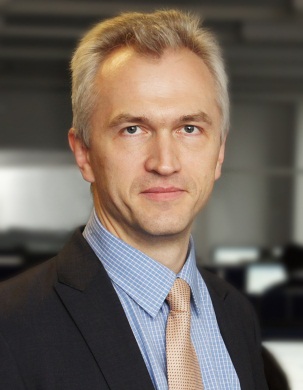Technology – where global careers start – Citi Service Center Poland

Editor

related articles
In recent years, new technologies have rapidly changed the face of the business world. Every interaction, both inside and outside an organisation (with customers, partners and suppliers), has to be fast and ensure short response time.
Nowadays, it is impossible to imagine a modern company without proper IT support – efficient servers and networks.
IT systems can be compared to a bloodstream – without them functioning correctly, no company would be able to make important business decisions.
It is the basis of the entire IT environment and one of the essential elements of any company. A wise choice of components and good cooperation with experts is the key to success.
Learn more about the role IT plays in a global financial institution and explore the professional possibilities offered in this field. Read the interview with Marek Dryjański, EMEA GCG Infrastructure Services Head at Citi, who is responsible for Global Production Operations.
CareersinPoland: Let us start with your career in Citi. What did your professional path look like?
Marek Dryjański: I have been with Citi for 22 years and I have held many positions. Right now, I am the Head of Production Operations, which is in charge of monitoring Citi’s global infrastructure. It is the second centre of its kind in the world. The first one is located in the USA. Because of that, we provide an uninterrupted flow of our processes, 24 hours a day, 7 days a week.
What does IT bring to the development of a company like yours? I am asking both about the bigger perspective – technology in general – but also about the infrastructure itself.
I would separate these two notions, because young people do not have a good understanding of the term technology. They tend to narrow it down to a PC, a mobile phone and applications. These are obviously very important areas, but technology is a complex and extensive field, encompassing infrastructure, which gives a lot of interesting job opportunities. Coming back to your question – I think the answer is quite obvious. We live in the era of digital mobility and can experience virtual reality, so it is difficult to find a company that does not make use of its IT support. It is a key element in every organisation and a source of innovation. Thanks to new technologies, we create products and services and distribute our offer in a fast and efficient manner.
And how should we understand the term IT infrastructure?
IT infrastructure means the area devoted to supervising and running processes shared within the entire organisation, i.e. all the computer networks. The infrastructure includes data processing centres, platform administration, operating systems (Windows, Linux, Unix) and firewall components used to secure the network from the outside. Without the proper management of this infrastructure, it would not be possible to install business applications, which support the activities of any financial institution.
It is clear then that IT infrastructure is a key element in running any company…
I would go even further, which may surprise some young graduates. Within our operational centre, we take care of so many processes that we can easily compare our unit in Citi to some of the IT giants, such as Apple or Google. Of course, each of them specialises in a different field, but with some other global IT players we constitute an important part of the technological reality. I wanted to mention it because it is very often ignored.
What kind of candidates are you looking for? Do you hire only students and graduates with technical backgrounds?
We have a lot of employees who do not have a technical college diploma and fit perfectly well into our team. Sometimes people want to join us because they are interested in IT, but they did not realise it when they were choosing their studies. Citi gives them a chance to start their career in this area thanks to training programmes and tasks undertaken by young specialists. For example, our monitoring specialists and project managers do not have to be graduates of any specific kind of university. By supporting our employees, we succeed in developing their skills, which allow them to carry out even very complex technological projects. Each of them can count on their mentor at the beginning of the road and has access to a training set.
If technical expertise is not one of the requirements, what abilities are you looking for during the recruitment process?
Soft skills are of great importance to us – this is what makes a young person successful in a big company. Interest in learning, flexibility, adaptation to new environments, accepting challenges, taking responsibility for one’s actions, cooperation – we value these skills greatly. IT is becoming less of a narrow field and more of a territory for people who can both understand technical issues and communicate with other businesses in order to get their point of view. This is why stepping out of a box, creativity and an ability to draw conclusions are so important to Citi. Of course, another thing that we have to check is the candidate’s command of English.
You mentioned the position of IT Project Manager. What other jobs also need recognition?
There are many of them. In the field closest to my heart we are searching for employees who can administer networks, operational systems or platforms such as Unix, Wintel, Linux, VMware, Oracle, MS SQL. Our experts can also realise their potential in software or business application development, as well as in service delivery, which is responsible for the stability of particular services. We also offer jobs related to change management, which are in charge of controlling the process of changes.
Can you give us some examples of what responsibilities process administrators have?
In the bigger picture, this process can be divided into the infrastructure department, the production support department and the application support department. Of course, these departments can also be broken down by function, i.e. the infrastructure department is concerned with end-user support, but also with monitoring and maintaining the infrastructure. Then, there are administrators, who are in charge of more complex cases and advanced technologies. There is also a team of experts who implement new solutions related to platform development. This requires proper servers, arrays and software in order to share the infrastructure with the application support departments.
What about the monitoring?
We have at our disposal many tools that automatically report any computer failures to the central system. Further steps are taken by a dedicated team who choose their actions in accordance with the type of malfunction present in the system.
How about application development? Young people associate this term mainly with mobile banking. What are these applications really about? Do they involve internal systems that are ultimately used by end-users?
Citi uses both premade solutions purchased from external suppliers and business applications we created ourselves. The spectrum of these technological instruments is too vast to describe here. We use so many tools that anyone interested in developing or supporting only a particular application will probably find it in our organisation.
I suppose that you also have a testing team responsible for checking the functionality of your purchases?
This is a task for the application support department. They have to understand business expectations and check the utility of particular business applications. Thanks to them, our end-users have access to these applications day or night.
Citi offers a wide range of jobs on the career path. Can your employees migrate between the jobs you have described earlier?
We try to provide them with such opportunities, but it is the employee who makes the final decision. People in our company either prefer to progress in one field in order to become an expert, or they like to switch their areas of interest from time to time. We value mobility because it enhances the flow of knowledge within our organisation. Therefore, before looking for experts on the job market, we consider promoting our employees first.
I gather that young people joining your team can count on guidance from their co-workers?
They would not be able to manage without that. The support from a supervisor and fellow colleagues is crucial. This is why we promote the idea of helping one another. We have created an entire induction programme designed to introduce every new employee to the profile of our organisation, their possible career path and the processes that we implement. This helps them understand their role better and broadens their perspective.
How else does Citi enhance the development of its employees?
Citi is based on knowledge, so the transfer of information and competence is a priority. We do it in three ways. First of all, we organise training sessions to enhance our soft skills. Secondly, we support learning from one another. The third aspect involves gaining new knowledge in practice, which is, in my view, the most effective form of learning. We want to keep our employees open to new challenges and encourage them to actively search for situations in which they are complete newcomers. The manager and the subordinate are obliged to work out a development strategy that will adjust these three learning areas to the expectations of our experts.
I suppose that IT is a male-dominated territory?
Indeed, it is usually chosen by men, which is a shame, because at Citi we value diversity and would like to see more women among us. Females are very good at dealing with infrastructure. I could give you a lot of examples proving they are better than men.
The quality of the workplace and its friendly atmosphere are increasingly important to young people. What can they expect in this respect when joining IT structures?
The atmosphere in Citi Service Center Poland is undoubtedly one of its assets, and young people value it highly once they start to work here. It is really worth having a career in Citi and I am a good example of that. The moment you join Citi you are presented not only with new challenges, but also with the kindness of your fellow co-workers.
You managed to build a global competency centre thanks to your potential and investments in people. Does Citi support creativity?
Of course it does. Without creativity and being open to multiple cultures and experiences, we would not be able to become an innovative company. We are the strength of Citi. It is the people who make any success possible, not the building, location or new technologies. We are the organisation’s capital and it would be a mistake to waste this potential, brought to us every day by our employees.
Translated by Ewelina Nurczyk

 Our expert: Marek Dryjański
Our expert: Marek Dryjański
Head of EMEA GCG Infrastructure Services at Citi Service Center Poland
With years of experience in IT management within a global company, he currently runs the department responsible for monitoring ICT infrastructure.












